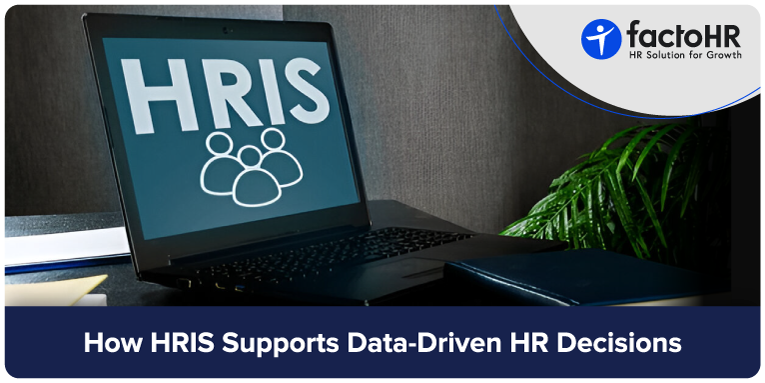How HRIS Systems Support Data-Driven HR Decisions

Table of Contents
Introduction
The oft-quoted statement, “Data is the new oil,” is proving true in a world where data has become the new currency. Rapid technological advancements make businesses more competitive and more protective of their data. Many firms rely heavily on data-driven decision-making to outperform their competitors in such a scenario. So, data management tools are becoming all the more important for organizations.
According to Forbes, “businesses that rely on data management tools to make decisions are 58% more likely to beat their revenue goals than non-data-driven companies.” This establishes that data management tools such as HRIS are critical for data-driven HR decisions. Human Resource Information System (HRIS) plays a pivotal role in decision-making. It facilitates data-driven decisions by managing information such as employee records.
An HRIS stores, manages, and analyzes all recruitment and performance evaluation information. Thus, it assists executives and HR managers in assessing employee performance and identifying the current needs of the workforce.
This guide explores the role of HRIS in data-driven HR and explains a few ways in which it could help your organization while implementing data-driven HR strategies.

What is the Importance of Data-Driven Decisions in HR?
Earlier, HR managers relied on intuition and best practices when making decisions. However, from the 1970s, leaders started to recognize the importance of basic data such as attendance records. Then, in the early 2000s and 2010s, the advent of ATS and big data analytics revolutionized decision-making by offering access to candidate information. In the 2020s, organizations integrate advanced capabilities such as AI and machine learning with HRIS to plug workforce gaps and forecast future needs.
Better data contributes to organizational growth by enhancing various processes such as hiring, employee engagement, performance management, and compliance.
- Hiring: Analyzing available data, such as cost per hire and retention rates, would help reduce hiring costs and improve the quality of hires.
- Employee engagement: Various engagement metrics, such as regular surveys, communication patterns, and team dynamics, assist in improving employee engagement by identifying potential areas for improvement.
- Performance management: You can identify high-potential employees by utilizing historical data such as performance ratings, skills, and competencies. Based on this analysis, you can also design targeted development programs.
- Compliance: Real-time updates about legislation changes help track employee laws.

In What Ways does HRIS Support Data-Driven HR Decisions?
HRIS supports data-driven decisions in several ways. It helps store all the information in one place, facilitating easy access. As a data repository, HRIS also assists in utilizing historical data. Here are some ways in which HRIS supports data-driven decisions.
Centralized Data Storage and Easy Access
HRIS allows easy access to employee information by storing it in one place and integrating it with other systems such as payroll management software and performance management systems. Modern solutions also store the data in cloud centers, minimizing the risk of losing data and providing 24/7 access.
Improved Recruitment and Talent Management
HRIS supports data-driven decisions by facilitating historical recruitment and talent management data access. It assists in retrieving information related to recruitment channels. It also provides metrics such as cost per hire and time-to-fill, which help identify potential bottlenecks in the recruitment process. HRIS enables leaders to access employee performance data. Thus, HRIS helps implement data-driven HR strategies for hiring, developing, and retaining talent.
Better Workforce Planning and Succession Management
Having an HRIS for data-driven decisions can also be helpful in workforce planning. It provides comprehensive workforce analytics, including employee turnover, retirement, and absenteeism rates. Retirement rates help plan for business continuity, and employee turnover rates help prepare for current and future workforce demands.
Compliance and Risk Management
HRIS assists in HR compliance management with the following features –
- It provides real-time updates related to changes in various employee laws.
- It also streamlines tax management by automating manual tax calculations.
- An HRIS stores all employee information on cloud centers with end-to-end encryption, helping to avoid potential security risks.
- It assists during compliance audits by digitally managing compliance-related records.
Enhanced Employee Performance Management
The Human Resource Information System also aids in identifying skill gaps and developing tailored training programs for each employee. It manages analytics related to goal achievements and internal and external feedback, enhancing employee performance by gathering these metrics.
Analytics for Strategic HR Insights
It facilitates access to a number of metrics related to demographic diversity, making organizations more inclusive. An HRIS also reduces the cost per employee by managing real-time data on employee training and ROI. User-friendly dashboards make it easy to access HR analytics and reports.
HRIS also promotes payroll-linked performance initiatives by integrating with payroll, performance, and leave management systems.

Conclusion
HRIS is perhaps the most important tool for today’s HR department, as it has become a strategically important tool. HR departments are also evolving with the changing business environment and playing a proactive role in decision-making. HRIS has a far-reaching impact on all HR operations. It helps automate payroll management and facilitates timely and accurate performance evaluation and recruitment data.
It bears repeating that having an HRIS is a must for any organization, especially in an era when data-backed decisions are the key to success and outperforming peers.
Advanced HRIS solutions, such as factoHR, offer predictive analytics and in-built integration with payroll, performance, and leave management systems. Schedule a free demo to experience the future of decision-making!
How Can HRIS Contribute to Strategic Decision-Making?
HRIS can contribute to strategic decision-making in the following ways-
- It can offer real-time insights such as training completion and employee turnover rates.
- It can assist with descriptive, diagnostic, and predictive analytics.
- Descriptive analytics can help evaluate past and present trends.
- Diagnostic analytics can help identify the factors behind any observed trend, such as decreased employee engagement.
- In predictive analytics, HRIS can provide data for forecasting future outcomes.
Can HRIS Facilitate Data-Driven Hiring?
Yes. HRIS supports data-driven hiring by providing various metrics such as time-to-fill and cost per hire. It also includes information about different recruitment channels to enhance the hiring process.
What are Different Metrics Provided by HRIS for Data-Driven HR Decisions?
HRIS provides several metrics. Some of the key metrics are –
- Time to Hire: Measures the duration a candidate applies and accepts a job offer.
- Cost per Hire: Calculates total expenses incurred during the hiring process.
- Employee Retention Rate: Evaluates an organization’s ability to retain employees.
- Training ROI: Calculates the Return On Investment from training programs.
- Employee Engagement Score: Reviews the level of employee commitment and satisfaction.
Grow your business with factoHR today
Focus on the significant decision-making tasks, transfer all your common repetitive HR tasks to factoHR and see the things falling into their place.

© 2025 Copyright factoHR


